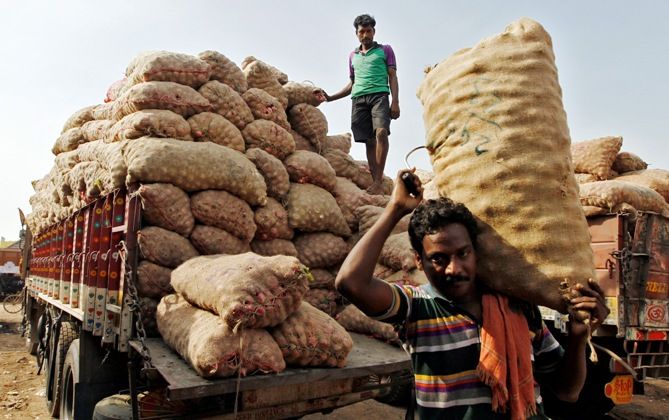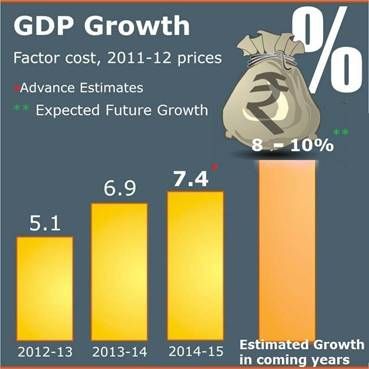
Indian Economy is looking-up with brighter prospects amongst the world’s major economies today.
The Economic Survey 2014-15 presented by Finance Minister Arun Jaitley to the Parliament on Friday indicates that a clear political mandate for reform and a benign external environment now is expected to propel India on to a double digit trajectory.
It states that Indian economy appears to have now gone past the economic slowdown, persistent inflation, elevated fiscal deficit, slackening domestic demand, external account imbalances and oscillating value of the rupee.
The Economic Survey taking into consideration the change of base year by the Central Statistics Office of the National Accounts series from 2004-05 to 2011-12, states that growth at market prices for 2015-16 is expected to be 8.1-to 8.5 per cent.
The growth rate in GDP at constant (2011-12) market prices in 2012-13 was 5.1 per cent, which increased to 6.9 per cent in 2013-14 and it is expected to further increase to 7.4 per cent in 2014-15 (According to advanced estimates).
The change in methodology by the Central Statistics Office has also introduced the concept of Gross Value Added at the aggregate and various sectoral levels.
The Economic Survey says that expectation for such a growth rate is also due to a number of reforms that have already been undertaken and more that are being planned for.
Budget 2015: Complete Coverage
The Survey enlist various reform measures like de-regulation of diesel price, taxing energy products, replacing cooking gas subsidy by direct transfer on national scale, passing an Ordinance to reform the coal sector via auctions, increasing the FDI caps in defence, etc.
The Survey report also commended the far reaching changes brought about on the issue of sharing of revenues between the Centre and States as recommended by the 14th Finance Commission.
The Survey says that decline in inflation by over 6 percentage points since late 2013 and also reduction of current account deficit from a peak of 6.7 per cent of GDP in the third quarter of 2012-13 to about one (1) per cent in the coming fiscal year has made India an attractive investment destination well above most other countries.
The expected high growth rate in the coming year in the favourable economic environment has created a historic movement of opportunity to propel India into a double-digit growth trajectory to attain the fundamental objective of “wiping every tear from every eye” of the vulnerable and poor people of the country, the survey says.
It also gives an opportunity to the increasingly young, middle-class and aspirational India to realize its full potential.
As the new Government is to present its first full year budget, the Economic Survey states that it appears that India has reached a sweet spot and that there is a scope for Big Bang reforms now.
The growth estimates of over 8 per cent for the current year is on expectations that the monsoon will be favourable, as it was forecast to be normal, compared to last year.
However the growth rate in Gross Value Added at basic prices in agriculture is projected to decline from 3.7 per cent in 2013-14, an exceptionally good previous year from the point of view of rainfall, to 1.1 per cent in 2014-15, the current year with not-so-favourable monsoon.
The Economic Survey has also drawn our attention to certain other stagnating or declining elements of the economy in the recent past.
It says that the growth in 2014-15 is largely driven by domestic demand.
There is hardly any external support to growth in 2014-15, as the growth in exports is projected to be only 0.9 per cent and the growth rate of imports, around (-) 0.5 per cent.
The deceleration in imports owe substantially to the sharp decline in international oil prices in the current year that compressed the oil import bill.
 It also says that there has been a decline in the rate of gross domestic saving, from 33.9 per cent of the GDP in 2011-12 to 31.8 per cent in 2012-13 and further to 30.6 per cent in 2013-14, caused majorly by the sharp decline in the rate of household physical savings.
It also says that there has been a decline in the rate of gross domestic saving, from 33.9 per cent of the GDP in 2011-12 to 31.8 per cent in 2012-13 and further to 30.6 per cent in 2013-14, caused majorly by the sharp decline in the rate of household physical savings.
Further it states that investment rate over the past years, as measured by Gross capital formation as a percentage of GDP declined from 38.2 per cent in 2011-12 to 36.6 per cent in 2012-13 and further to 32.3 per cent in 2013-14.
On investments the Survey had significantly commented that while private investment must remain the primary engine of long-run growth, the public investment, especially in the railways, will have to play an important role at least in the interim, to revive growth and to deepen physical connectivity.
This Economic Survey prescribes, what its calls, a golden rule of fiscal policy saying that governments are expected to borrow over the cycle only to finance investment and not to fund current expenditures.
It urged the government to aim at bringing down the centre’s fiscal deficit down to 3 per cent of GDP.
The Economic Survey made some interesting comments saying that price subsidies do not appear to have had a transformative effect on the living standards of the poor, though they have helped poor households to weather inflation and price volatility.
It says that a close look at price subsidies, which are estimated to be about Rs 3,78,000 crore (Rs 3,780 billion), about 4.24 per cent of GDP, reveal that they may not be the government’s best weapon for fighting poverty.
Dwelling upon various subsidies to the poor, the Survey even stated that price subsidies are often regressive.
It said, an analysis of current subsidy scheme indicates that rich households benefit more from the subsidy than a poor household.
Among various examples that it had dwelt upon the Survey said that subsidy on electricity can only benefit the relatively rich.
The Survey, however, concluded that eliminating or phasing down subsidies is neither feasible nor desirable.
It said that by adopting what it called the JAM Number Trinity-Jan Dhan Yojana, Aadhaar and Mobile numbers would allow the State to deliver the subsidies to poor in a targeted and less distorted manner.
The Economic Survey had expressed a serious concern that several projects have been stalled and such a tendency is increased over the past years.
In the same breath the Survey report expressed happiness that such stalling of projects seems to have plateaued.
It suggested revitalizing public private partnership model of investment.
Dwelling upon the issue of manufacturing versus services for the growth of the economy the Survey says, both are equally important in the Indian context.
Similarly, “Skilling India” is no less important and deserves an equal attention as the other important goal of “Make in India “.
In a Chapter on a Common National Market for Agricultural Commodities the Survey without making any conclusions suggested that there may be a Constitutional provision used to regulate trading in specified agricultural commodities to create a National Common Market.
In an exclusive Chapter relating to the Fourteenth Finance Commission, the Economic Survey quoted both Pandit Jawahar Lal Nehru, the first Prime Minister of the country and the current Prime Minister Shri Narendra Modi and said that adoption of the recommendations of the FFC and the creation of Niti Ayog earlier would further take forward the government’s vision of cooperative and competitive federalism.
Text: Kind courtesy, PIB
Image: Labourers unload sacks filled with onions at a wholesale vegetable market in Chennai. Photograph: Babu/Reuters










